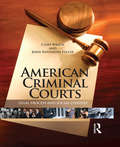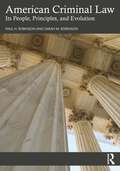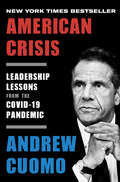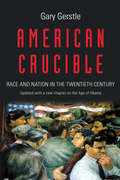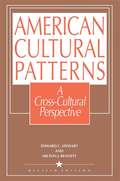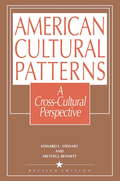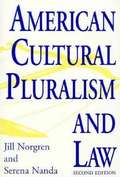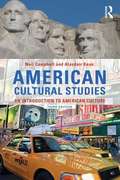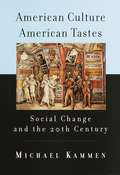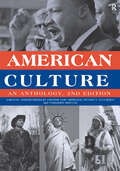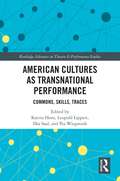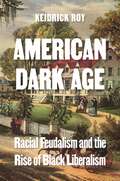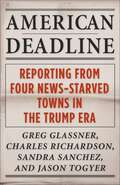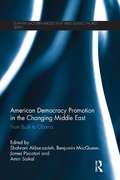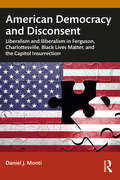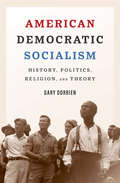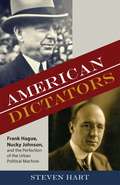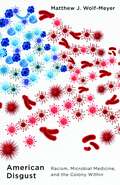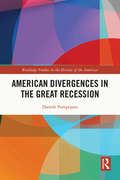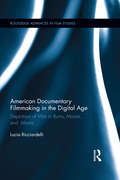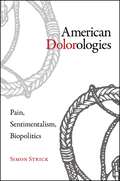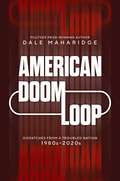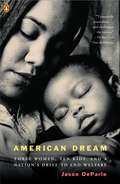- Table View
- List View
American Courage
by Herbert W. Warden IIIDrawn from firsthand and historical writings, this book gives voice to the pilgrims, founding fathers, revolutionaries, pioneers, '49ers, cowboys, soldiers, pilots, and the many other heroes who have built the nation.
American Criminal Courts: Legal Process and Social Context
by John Randolph Fuller Casey WelchAmerican Criminal Courts: Legal Process and Social Context is an introductory-level text that offers a comprehensive study of the legal processes that guide criminal courts and the social contexts that introduce variations in the activities of actors inside and outside the court. Specifically the text focuses upon: Legal Processes. U.S. criminal courts are constrained by several legal processes and organizational structures that determine how the courts operate and how laws are applied. This book explores how democratic processes develop the criminal law in the United States, the documents that define law (federal and state constitutions, legal codes, administrative policies), the organizational structure of courts at the federal and state levels, the overlapping authority of the appeals process, and the effect of legal processes such as precedent, jurisdiction, and the underlying legal philosophies of various types of courts. Although most texts on criminal courts do a credible job of describing legal processes, this text looks more deeply into the origins of criminal law, historic turning points in the criminal law, conditions that affect the decision-making of criminal justice practitioners, and the contentious political process that affects how criminal laws are considered. Social Contexts. The criminal courts are staffed by people who represent different perspectives, occupational pressures, and organizational goals. The text includes chapters on actors in the traditional courtroom workgroup (judges, prosecutors, and defense attorneys), as well as those outside the court who seek to influence it, including advocacy groups, media, and politicians. It is the interplay between the court legal processes and the social actors in the courtroom that makes the application of the criminal laws so fascinating. By focusing on the tension between the law (legal processes) and the actors inside and outside the courts system (social contexts), this text demonstrates how the courts are a product of "law in action," and it presents the course content in a way that enables students to understand not only the "how" of the U.S. criminal court system but also the "why."
American Criminal Justice Policy
by Daniel P. MearsAmerican Criminal Justice Policy examines many of the most prominent criminal justice policies on the American landscape and finds that they fall well short of achieving the accountability and effectiveness that policymakers have advocated and that the public expects. The policies include mass incarceration, sex offender laws, supermax prisons, faith-based prisoner reentry programs, transfer of juveniles to adult court, domestic violence mandatory arrest laws, drug courts, gun laws, community policing, private prisons, and others. Optimistically, Daniel P. Mears argues that this situation can be changed through systematic incorporation of evaluation research into policy development, monitoring, and assessment. To this end, the book provides a clear and accessible discussion of five types of evaluation - needs, theory, implementation or process, outcome and impact, and cost-efficiency. It identifies how these can be used both to hold the criminal justice system accountable and to increase the effectiveness of crime control and crime prevention efforts.
American Criminal Law: Its People, Principles, and Evolution
by Paul H. Robinson Sarah M. RobinsonThis coursebook offers an exciting new approach to teaching criminal law to graduate and undergraduate students, and indeed to the general public. Each well-organized and student-friendly chapter offers historical context, tells the story of a principal historic case, provides a modern case that contrasts with the historic, explains the legal issue at the heart of both cases, includes a unique mapping feature describing the range of positions on the issue among the states today, examines a key policy question on the topic, and provides an aftermath that reports the final chapter to the historic and modern case stories. By embedding sophisticated legal doctrine and analysis in real-world storytelling, the book provides a uniquely effective approach to teaching American criminal law in programs on criminal justice, political science, public policy, history, philosophy, and a range of other fields.
American Crisis: Leadership Lessons from the COVID-19 Pandemic
by Andrew CuomoGovernor Andrew Cuomo tells the riveting story of how he took charge in the fight against COVID-19 as New York became the epicenter of the pandemic, offering hard-won lessons in leadership and his vision for the path forward. When COVID-19 besieged the United States, New York State emerged as the global “ground zero” for a deadly contagion that threatened the lives and livelihoods of millions. Quickly, Governor Andrew Cuomo provided the leadership to address the threat, becoming the standard-bearer of the organized response the country desperately needed. With infection rates spiking and more people dying every day, the systems and functions necessary to combat the pandemic in New York—and America—did not exist. <P><P>So Cuomo undertook the impossible. He unified people to rise to the challenge and was relentless in his pursuit of scientific facts and data. He quelled fear while implementing an extraordinary plan for flattening the curve of infection. He and his team worked day and night to protect the people of New York, despite roadblocks presented by a president incapable of leadership and addicted to transactional politics. Taking readers beyond the candid daily briefings that became must-see TV across the globe, and providing a dramatic, day-by-day account of the catastrophe as it unfolded, American Crisis presents the intimate and inspiring thoughts of a leader at an unprecedented historical moment. <P><P>In his own voice, Andrew Cuomo chronicles the ingenuity and sacrifice required of so many to fight the pandemic, sharing the decision-making that shaped his policy as well as his frank accounting and assessment of his interactions with the federal government, the White House, and other state and local political and health officials. Real leadership, he shows, requires clear communication, compassion for others, and a commitment to truth-telling—no matter how frightening the facts may be. Including a game plan for what we as individuals—and as a nation—need to do to protect ourselves against this disaster and those to come, American Crisis is a remarkable portrait of selfless leadership and a gritty story of difficult choices that points the way to a safer future for all of us. <P><P><b>A New York Times Bestseller</b>
American Crucible: Race and Nation in the Twentieth Century
by Gary GerstleThis sweeping history of twentieth-century America follows the changing and often conflicting ideas about the fundamental nature of American society: Is the United States a social melting pot, as our civic creed warrants, or is full citizenship somehow reserved for those who are white and of the "right" ancestry? Gary Gerstle traces the forces of civic and racial nationalism, arguing that both profoundly shaped our society. After Theodore Roosevelt led his Rough Riders to victory during the Spanish American War, he boasted of the diversity of his men's origins- from the Kentucky backwoods to the Irish, Italian, and Jewish neighborhoods of northeastern cities. Roosevelt’s vision of a hybrid and superior “American race,” strengthened by war, would inspire the social, diplomatic, and economic policies of American liberals for decades. And yet, for all of its appeal to the civic principles of inclusion, this liberal legacy was grounded in “Anglo-Saxon” culture, making it difficult in particular for Jews and Italians and especially for Asians and African Americans to gain acceptance. Gerstle weaves a compelling story of events, institutions, and ideas that played on perceptions of ethnic/racial difference, from the world wars and the labor movement to the New Deal and Hollywood to the Cold War and the civil rights movement. We witness the remnants of racial thinking among such liberals as FDR and LBJ; we see how Italians and Jews from Frank Capra to the creators of Superman perpetuated the New Deal philosophy while suppressing their own ethnicity; we feel the frustrations of African-American servicemen denied the opportunity to fight for their country and the moral outrage of more recent black activists, including Martin Luther King, Jr., Fannie Lou Hamer, and Malcolm X. Gerstle argues that the civil rights movement and Vietnam broke the liberal nation apart, and his analysis of this upheaval leads him to assess Reagan’s and Clinton’s attempts to resurrect nationalism. Can the United States ever live up to its civic creed? For anyone who views racism as an aberration from the liberal premises of the republic, this book is must reading.Containing a new chapter that reconstructs and dissects the major struggles over race and nation in an era defined by the War on Terror and by the presidency of Barack Obama, American Crucible is a must-read for anyone who views racism as an aberration from the liberal premises of the republic.
American Cultural Patterns: A Cross-Cultural Perspective
by Milton J. Bennett Edward C. StewartThis classic study was originally written by Edward Stewart in 1972 and has become a seminal work in the field of intercultural relations. In this edition, Stewart and Milton J. Bennett have greatly expanded the analysis of American cultural patterns by introducing new cross-cultural comparisons and drawing on recent reseach on value systems, perception psychology, cultural anthropology, and intercultural communication. Beginning with a discussion of the issues relative to contact between people of different cultures, the authors examine the nature of cultural assumptions and values as a framework for cross-cultural analysis. They then analyze the human perceptual process, consider the influence of language on culture, and discuss nonverbal behavior. Central to the book is an analysis of American culture constructed along four dimentions: form of activity, form of social relations, perceptions of the world, and perception of the self. American cultural traits are isolated out, analyzed, and compared with parallel characteristics of other cultures. Finally, the cultural dimentions of communication and their implications for cross-cultural interaction are examined.
American Cultural Patterns: A Cross-Cultural Perspective
by Milton J. Bennett Edward C. StewartThis classic study was originally written by Edward Stewart in 1972 and has become a seminal work in the field of intercultural relations. In this edition, Stewart and Milton J. Bennett have greatly expanded the analysis of American cultural patterns by introducing new cross-cultural comparisons and drawing on recent reseach on value systems, perception psychology, cultural anthropology, and intercultural communication. Beginning with a discussion of the issues relative to contact between people of different cultures, the authors examine the nature of cultural assumptions and values as a framework for cross-cultural analysis. They then analyze the human perceptual process, consider the influence of language on culture, and discuss nonverbal behavior. Central to the book is an analysis of American culture constructed along four dimentions: form of activity, form of social relations, perceptions of the world, and perception of the self. American cultural traits are isolated out, analyzed, and compared with parallel characteristics of other cultures. Finally, the cultural dimentions of communication and their implications for cross-cultural interaction are examined.
American Cultural Pluralism and Law (Second Edition)
by Serena Nanda Jill NorgrenAn important text for courses in American Government, society and the law, cultural studies, and civil rights. - Back Cover
American Cultural Studies
by Neil Campbell Alasdair KeanThis third edition of American Cultural Studies has been updated throughout to take into account the developments of the last six years, providing an introduction to the central themes in modern American culture and explores how these themes can be interpreted. Chapters in the book discuss the various aspects of American cultural life such as religion, gender and sexuality, and regionalism. Updates and revisions include: discussion of Barack Obama's rise to power and the end of the 'Bush Years', consideration of 'Hemispheric American Studies' and the increasing debates about globalisation and the role of the USA, up-to-date case-studies, such as The Wire and Nurse Jackie, more on suburbia, the Mexican-border crossing, the Twilight phenomena etc, updated further-reading lists. Accompanying website. American Cultural Studies is a core text and an accessible introduction to the interdisciplinary study of American culture.
American Culture, American Tastes: Social Change and the 20th Century
by Michael KammenAmericans have a long history of public arguments about taste, the uses of leisure, and what is culturally appropriate in a democracy that has a strong work ethic. Michael Kammen surveys these debates as well as our changing taste preferences, especially in the past century, and the shifting perceptions that have accompanied them.Professor Kammen shows how the post-traditional popular culture that flourished after the 1880s became full-blown mass culture after World War II, in an era of unprecedented affluence and travel. He charts the influence of advertising and opinion polling; the development of standardized products, shopping centers, and mass-marketing; the separation of youth and adult culture; the gradual repudiation of the genteel tradition; and the commercialization of organized entertainment. He stresses the significance of television in the shaping of mass culture, and of consumerism in its reconfiguration over the past two decades.Focusing on our own time, Kammen discusses the use of the fluid nature of cultural taste to enlarge audiences and increase revenues, and reveals how the public role of intellectuals and cultural critics has declined as the power of corporate sponsors and promoters has risen. As a result of this diminution of cultural authority, he says, definitive pronouncements have been replaced by divergent points of view, and there is, as well, a tendency to blur fact and fiction, reality and illusion.An important commentary on the often conflicting ways Americans have understood, defined, and talked about their changing culture in the twentieth century.
American Culture: An Anthology
by Anders Breidlid Fredrik Chr. Brøgger Oyvind T. Gulliksen Torbjorn SirevagThis second edition of American Culture includes contemporary events and provides an introduction to American civilization. Extracts are taken from diverse sources such as political addresses, articles, interviews, oral histories and advertisements. Edited by academics who are highly experienced in the study and teaching of American Studies across a wide range of institutions, this book provides: texts that introduce aspects of American society in a historical perspective primary sources and images that can be used as the basis for illustration, analysis and discussion linking text which stresses themes rather than offering a simple chronological survey. American Culture brings together primary texts from 1600 to the present day to present a comprehensive overview of, and introduction to, American culture.
American Cultures as Transnational Performance: Commons, Skills, Traces (Routledge Advances in Theatre & Performance Studies)
by Katrin Horn Ilka Saal Pia Wiegmink Leopold LippertThis book investigates transnational processes through the analytic lens of cultural performance. Structured around key concepts of performance studies––commons, skills, and traces––this edited collection addresses the political, normative, and historical implications of cultural performances beyond the limits of the (US) nation-state. These three central aspects of performance function as entryways to inquiries into transnational processes and allow the authors to shift the discussion away from text-centered approaches to intercultural encounters and to bring into focus the dynamic field that opens up between producer, art work, context, setting, and audience in the moment of performance as well as in its afterlife. The chapters provide fresh, performance-based approaches to notions of transcultural mobility and circulation, transnational cultural experience and knowledge formation, transnational public spheres, and identities’ rootedness in both specific local places and diasporic worlds beyond the written word. This book will be of great interest to scholars and students of American studies, performance studies, and transnational studies
American Dark Age: Racial Feudalism and the Rise of Black Liberalism
by Keidrick RoyHow medieval-inspired racial feudalism reigned in early America and was challenged by Black liberal thinkersThough the United States has been heralded as a beacon of democracy, many nineteenth-century Americans viewed their nation through the prism of the Old World. What they saw was a racially stratified country that reflected not the ideals of a modern republic but rather the remnants of feudalism. American Dark Age reveals how defenders of racial hierarchy embraced America&’s resemblance to medieval Europe and tells the stories of the abolitionists who exposed it as a glaring blemish on the national conscience.Against those seeking to maintain what Frederick Douglass called an &“aristocracy of the skin,&” Keidrick Roy shows how a group of Black thinkers, including Frances Ellen Watkins Harper, Hosea Easton, and Harriet Jacobs, challenged the medievalism in their midst—and transformed the nation&’s founding liberal tradition. He demonstrates how they drew on spiritual insight, Enlightenment thought, and a homegrown political philosophy that gave expression to their experiences at the bottom of the American social order. Roy sheds new light on how Black abolitionist writers and activists worked to eradicate the pernicious ideology of racial feudalism from American liberalism and renew the country&’s commitment to values such as individual liberty, social progress, and egalitarianism.American Dark Age reveals how the antebellum Black liberal tradition holds vital lessons for us today as hate groups continue to align themselves with fantasies of a medieval past and openly call for a return of all-powerful monarchs, aristocrats, and nobles who rule by virtue of their race.
American Deadline: Reporting from Four News-Starved Towns in the Trump Era (Columbia Journalism Review Books)
by Charles Richardson Greg Glassner Sandra Sanchez Jason TogyerThe dramatic events of 2020—the presidential election, the COVID-19 pandemic, protests for racial justice—affected every corner of American life. What did these events mean for the residents of small towns and cities that are often overlooked by national newspapers? How do local stories change when they are told by journalists with roots in these communities? And what is lost as this kind of coverage disappears?American Deadline brings together dispatches from four longtime local journalists in different parts of the United States that tell the story of 2020 anew. It shares reporting from Bowling Green, Virginia; Macon, Georgia; McKeesport, Pennsylvania; and McAllen, Texas—two towns that lost their local newspapers and two where they are barely hanging on. The authors consider what makes each town distinctive and how these local perspectives tell a part of a broader American story. This book reports on how residents of these towns grapple with and talk about issues relating to race, schooling, health, immigration, deindustrialization, as well as local and national politics amid a changing and increasingly precarious information ecosystem. A distinct and intimate look at a calamitous year, American Deadline is an important book for all readers interested in the possibilities and future of local journalism.
American Democracy Promotion in the Changing Middle East: From Bush to Obama (Durham Modern Middle East and Islamic World Series)
by Amin Saikal Shahram Akbarzadeh James Piscatori Benjamin MacQueenThe recent "Arab spring", with its popular uprisings in many Arab countries, has exposed the ambiguity at the heart of American promotion of democracy in the Middle East. The US invasions of Afghanistan and Iraq were packaged as democracy promotion, as heralding the beginning of a new phase in the politics of the Middle East when democracy would replace authoritarian regimes. Many of these authoritarian regimes, however, were sustained by US support. The recent popular uprisings threaten to bring democracy without promotion by the US, and threaten to overthrow regimes previously supported by the US and important for US strategy in the region – hence an initial hesitant response by the US to some of the uprisings. This book explores the contradictions in American democracy promotion in the Middle East. It discusses the principles underlying US democracy promotion, and the debates surrounding US policy formation, and examines the application of US democracy promotion in specific cases. It concludes by assessing the likely future patterns of US engagement with democratic reform in the Middle East.
American Democracy and Disconsent: Liberalism and Illiberalism in Ferguson, Charlottesville, Black Lives Matter, and the Capitol Insurrection
by Daniel MontiThis volume is a thorough re-examination of civil unrest and discontent in the United States, particularly the intersection of democracy and violence. The work argues that unrest and violence are embedded rituals of social and political "disconsent" and are constitutive features of citizen-based democracy.As such, they are part of how democratic life works: unrest is the eruptive, visible grammar of citizens in a democratic society. Democracy and citizen unrest and violence in the United States are set within a deeper history. The author traces the roots of American democracy – and the rituals of disconsent – to their sources in ancient Mediterranean political society, demonstrating that early democratic theory and practice understood unrest and revolt as morally grounded. Featuring case studies of recent episodes of political and social "disconsent" in the United States, the volume contextualizes the Black Lives Matter protests, unrest around police and institutional violence, and the Capitol insurrection on January 6.Through this, the book provides an important social theoretical lens through which to understand American discontent around racial injustice, political suppression, and citizen disillusionment.
American Democratic Socialism: History, Politics, Religion, and Theory
by Gary DorrienA sweeping, ambitious history of American democratic socialism from one of the world&’s leading intellectual historians and social ethicists &“Dorrien is supremely qualified for the task he has set himself in this very thoughtful, necessary, and timely book.&”—Maurice Isserman, author of The Other American: The Life of Michael Harrington Democratic socialism is ascending in the United States as a consequence of a widespread recognition that global capitalism works only for a minority and is harming the planet&’s ecology. This history of American democratic socialism from its beginning to the present day interprets the efforts of American socialists to address and transform multiple intersecting sites of injustice and harm. Comprehensive, deeply researched, and highly original, this book offers a luminous synthesis of secular and religious socialisms, detailing both their intellectual and their organizational histories.
American Dictators: Frank Hague, Nucky Johnson, and the Perfection of the Urban Political Machine (Rivergate Regionals Collection)
by Steven HartAmerican Dictators is the dual biography of two of America's greatest political bosses: Frank Hague and Enoch "Nucky" Johnson. The book shows Hague and Johnson at the peak of their power and the strength of their political machines during the years of Prohibition and the Great Depression. Steven Hart describes how both men used their influence to benefit and punish the local citizenry, amass huge personal fortunes, and sometimes collaborate to trounce their enemies.
American Disgust: Racism, Microbial Medicine, and the Colony Within
by Matthew J. Wolf-MeyerExamining the racial underpinnings of food, microbial medicine, and disgust in America American Disgust shows how perceptions of disgust and fears of contamination are rooted in the country&’s history of colonialism and racism. Drawing on colonial, corporate, and medical archives, Matthew J. Wolf-Meyer argues that microbial medicine is closely entwined with changing cultural experiences of digestion, excrement, and disgust that are inextricably tied to the creation of whiteness. Ranging from nineteenth-century colonial encounters with Native people to John Harvey Kellogg&’s ideas around civilization and bowel movements to mid-twentieth-century diet and parenting advice books, Wolf-Meyer analyzes how embedded racist histories of digestion and disgust permeate contemporary debates around fecal microbial transplants and other bacteriotherapeutic treatments for gastrointestinal disease. At its core, American Disgust wrestles with how changing cultural notions of digestion—what goes into the body and what comes out of it—create and impose racial categories motivated by feelings of disgust rooted in American settler-colonial racism. It shows how disgust is a changing, yet fundamental, aspect of American subjectivity and that engaging with it—personally, politically, and theoretically—opens up possibilities for conceptualizing health at the individual, societal, and planetary levels.
American Divergences in the Great Recession
by Daniele PompejanoGlobalization is quite different from internationalization: the by-now global market economy overwhelmed the sovereignty of the old national states. Close to the 2007 crisis, some de-coupling effects were consequent in most developed countries in comparison with the ex-Third World. Latin America seemed to entail a "divergence" with the First World, as unlike the past, it was not hit by the financial crisis, but old historical fragilities invalidated the short positive cycle produced by high international prices. This work deals with this crisis and its basic differences from the older crises of the Thirties and Seventies.
American Documentary Filmmaking in the Digital Age: Depictions of War in Burns, Moore, and Morris (Routledge Advances in Film Studies)
by Lucia RicciardelliAmerican Documentary Filmmaking in the Digital Age examines the recent challenges to the conventions of realist documentary through the lens of war documentary films by Ken Burns, Michael Moore, and Errol Morris. During the twentieth century, the invention of new technologies of audiovisual representation such as cinema, television, video, and digital media have transformed the modes of historical narration and with it forced historians to assess the impact of new visual technologies on the construction of history. This book investigates the manner in which this contemporary Western "crisis" in historical narrative is produced by a larger epistemological shift in visual culture. Ricciardelli uses the theme of war as depicted in these directors’ films to focus her study and look at the model(s) of national identity that Burns, Morris, and Moore shape through their depictions of US military actions. She examines how postcolonial critiques of historicism and the advent of digitization have affected the narrative structure of documentary film and the shaping of historical consciousness through cinematic representation.
American Dolorologies: Pain, Sentimentalism, Biopolitics (SUNY Press Open Access)
by Simon StrickAmerican Dolorologies presents a theoretically sophisticated intervention into contemporary equations of subjectivity with trauma. Simon Strick argues against a universalism of pain and instead foregrounds the intimate relations of bodily affect with racial and gender politics. In concise and original readings of medical debates, abolitionist photography, Enlightenment philosophy, and contemporary representations of torture, Strick shows the crucial function that evocations of "bodies in pain" serve in the politicization of differences. This book provides a historical contextualization of contemporary ideas of suffering, sympathy, and compassion, thus establishing an embodied genealogy of the pain that is at the heart of American democratic sentiment.This book is freely available in an open access edition thanks to Knowledge Unlatched—an initiative that provides libraries and institutions with a centralized platform to support OA collections and from leading publishing houses and OA initiatives. Learn more at the Knowledge Unlatched website at: https://www.knowledgeunlatched.org/, and access the book online at the SUNY Open Access Repository at http://hdl.handle.net/20.500.12648/1705.
American Doom Loop: Dispatches from a Troubled Nation, 1980s–2020s
by Dale MaharidgeMuch of the contemporary crazy can be traced to the 1980s—America of the 2020s is living with the cultural shapeshifting rooted in that decade.Americans lived in a different reality in 1980: Vermont was the only state that let residents carry a concealed firearm without a permit. Twenty-four states now allow this—and numerous other gun laws have fallen by the wayside. When police were accused of wrongdoing, the default answer from society&’s arbiters—courts, politicians, newspaper editors—was: &“The police wouldn&’t lie.&” Editors steered clear of stories about rape and sexual violence. The word &“homeless&” wasn&’t in common use. The fabric of the middle class had not yet begun fraying. America of the 2020s is living with cultural shapeshifting rooted in the 1980s. History, of course, is not a snapshot—it&’s a film. To understand the United States today, we have to know the 1980s. American Doom Loop chronicles the first part of that moving picture, then brings the story forward. As a newspaper journalist, Dale Maharidge had a front-row seat to this decade, immersed in disparate worlds. He was in the Philippines during the last days of Dictator Ferdinand Marcos, witnessing the US lose a critical piece of its empire dating to the Spanish–American War; he traveled to Central America where the East-West conflict was playing out by proxy; he smuggled a Salvadoran family marked by death squads, driving them through trackless desert to the US border; he embedded with a group that was a precursor to the Oath Keepers; and he investigated police, who kept trying to get him fired. Through it all, Maharidge gained an invaluable view of a complicated decade that offers insight into our society today.
American Dream
by Jason DeparleIn this definitive work, two-time Pulitzer finalist Jason DeParle cuts between the mean streets of Milwaukee and the corridors of Washington to produce a masterpiece of literary journalism. At the heart of the story are three cousins whose different lives follow similar trajectories. Leaving welfare, Angie puts her heart in her work. Jewell bets on an imprisoned man. Opal guards a tragic secret that threatens her kids and her life. DeParle traces their family history back six generations to slavery and weaves poor people, politicians, reformers, and rogues into a spellbinding epic. With a vivid sense of humanity, DeParle demonstrates that although we live in a country where anyone can make it, generation after generation some families don't. To read American Dream is to understand why.

